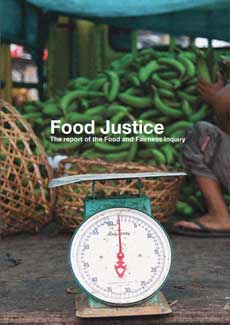
Food Justice
The Inquiry into Food and Fairness by the Food Ethics Council
by Elizabeth Dowler
The Inquiry into Food and Fairness by the Food Ethics Council (FEC, 2010), which, to help clarify the nature of important inequalities, adopted a social justice framework in terms of ‘fair shares’ (equality of outcome), ‘fair play’ (equality of opportunity) and ‘fair say’ (autonomy and voice). These conditions were applied to the three key food policy strands: food security, sustainability and public health. The Inquiry examined the symptoms and causes of food-related injustice, and attempted to analyse the complex relationships between unfairness, environmental degradation and ill-health.
It drew on a wide range of evidence submitted in response to a public call, as well as the very different perspectives of the members of the 14-strong Inquiry panel, half of whom were leading players in sectors and bodies in food and farming (the remainder were members of the FEC). The process of deliberating from very different viewpoints and having to engage with a variety of oral witnesses and written evidence was a critical feature of the Inquiry’s work, and enabled the challenges posed by conflicting understandings of these different interests to be made explicit and creatively addressed. The key messages from the Inquiry, whose report by the FEC Secretariat includes recommendations for government, businesses and civil society, are set out here:
Food Justice: The Report of the Food and Fairness Inquiry
Key Messages
'The Food and Fairness Inquiry was motivated by the concern that policy debate around sustainable food and farming does not attach due weight to issues of social justice. In addition to … the recommendations …, the Inquiry committee … formulated a series of "key messages" that encapsulate how the debate about food policy needs to change, in order to reflect the seriousness of social justice issues, and the ways in which they relate to concerns about environmental sustainability and public health.
- Food policy is central to meeting recognised ecological sustainability challenges.
- Social justice issues around food are at the heart of recognised environmental and health challenges.
- Addressing food-related social injustice mainly requires wider social and economic policy solutions.
- Social justice does not mean treating everyone the same.
- We need to find ways to engage people, and society as a whole, with food policy.
- To enable people to change their behaviour, we need to address the inequalities that underpin their behaviour.
- ‘Cheap food’ is no longer a legitimate social policy objective.
- The market, including the financial market, has to work differently.
- There are limits to what can be achieved through market mechanisms, so we need government leadership.
- The current international trade regime presents significant obstacles to addressing social injustice in food and farming.
- All stakeholders face limits to what they can achieve themselves but, for their commitment to social justice to be credible, they must openly support whatever measures are necessary but beyond their own capacity.
The UK is an unfair society in a deeply unfair world. The Food and Fairness Inquiry has shown how all of us – in government, business, and civil society – are to some extent implicated. This means that we all have responsibilities for doing something about it. We can each do much more before we run up against the limits to our responsibilities.' (FEC, 2010, p. 17-18)
The main summary message is a call to recognise the causes and consequences of social injustices within the food system, in the UK and elsewhere, and the imperative to do something about them, at every level. Of course, the intense pressures on all involved (consumers, producers, processors, scientists, retailers, workers) and the factors driving the system in current directions, have to be acknowledged. These trends, which are national and international, include those:
- in agricultural employment (fewer farmers and landowners, more landless labourers with fewer skills, demands for high flexibility so that producers bear more and more of the risk);
- in processing and retail (high levels of regulation which militates against small businesses remaining in the system, increasing short-termism from shareholders);
- in consumerism (increasingly values-driven, but with many unable to afford to put their values into practice).
Click here to download
